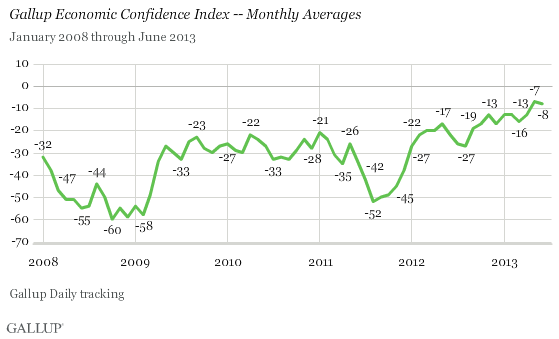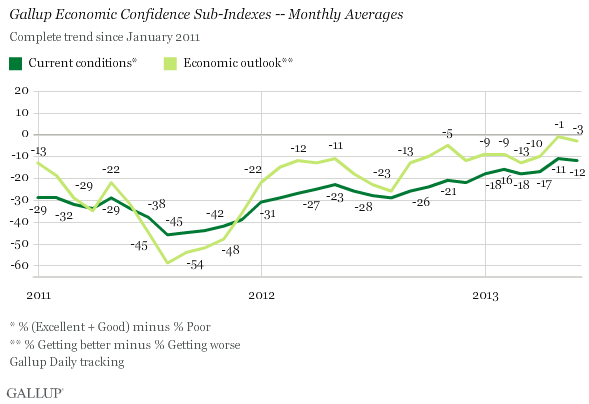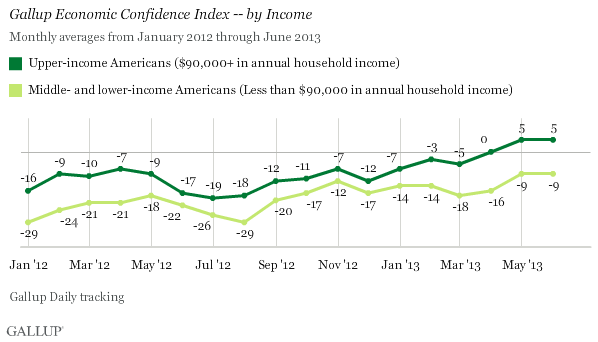WASHINGTON, D.C. -- Americans' confidence in the economy held steady in June, despite U.S. stock prices registering a monthly decline for the first time this year. Gallup's Economic Confidence Index averaged -8 in June, on par with -7 in May -- the highest monthly score since Gallup began tracking economic confidence daily in January 2008.

The stronger May and June ratings pushed the average confidence score for the second quarter of 2013 to -9, the third consecutive quarter the index has improved. The -9 second quarter score is also the best Gallup has measured for any quarter to date since it began daily tracking of confidence in 2008.
While U.S. stock prices declined in June, the Dow and S&P still had their best performances in the first half of the year since the late 1990s. Higher stock prices this year and increased optimism about housing prices have likely contributed to Americans' growing confidence.
The results for June are based on Gallup Daily tracking interviews, conducted by landline and cellphone, with more than 15,000 Americans. Gallup's Economic Confidence Index is based on two components: Americans' assessments of current economic conditions in the United States and their perceptions of whether the economy is getting better or worse. Americans remain more negative than positive toward the U.S economy's current state and future momentum.
Americans' net economic outlook was -3 in June, similar to the -1 recorded in May -- the highest monthly economic outlook score in more than five years. The current score is based on 46% of Americans saying the economy is getting better and 49% saying it is getting worse.
Americans' assessments of current economic conditions were essentially unchanged in June, at -12. The score reflects 20% of Americans rating current U.S. economic conditions as excellent or good and 32% saying they are poor.

Economic Confidence Levels Off Across Income Groups
Upper-income Americans' economic confidence was unchanged in June -- after entering positive territory for the first time in May. Similarly, lower- and middle-income Americans' confidence also held steady in June at a five-year monthly high, although it still remains in negative territory.

Bottom Line
Americans' confidence in the economy held steady at a relatively high level in June, despite volatility in the U.S. stock market and a tepid unemployment report from the U.S. Bureau of Labor Statistics. Still, Americans remain more negative than positive about the U.S. economy.
Several challenges in the coming months may affect Americans' confidence in the economy. First, disagreements in Washington over raising the federal debt limit could shake Americans' confidence, as was the case during partisan debates over the fiscal cliff and sequestration. The federal debt is one of Americans' greatest concerns for the nation's future and, therefore, a partisan showdown on this issue could lead to a decline in Americans' economic optimism.
Additionally, 41% of small-business owners said they are holding back on hiring because of the Affordable Care Act. That percentage could increase, and possibly lead to a drop in job creation, in the months leading up to full implementation of the law in January 2014.
Finally, rising interest rates could cause some consumers to feel more wary about taking out loans to make large purchases. This sentiment could negatively affect Americans' views of the overall economy.
Gallup.com reports results from these indexes in daily, weekly, and monthly averages and in Gallup.com stories. Complete trend data are always available to view and export in the following charts:
Daily: Employment, Economic Confidence and Job Creation, Consumer Spending
Weekly: Employment, Economic Confidence, Job Creation, Consumer Spending
Read more about Gallup's economic measures.
View our economic release schedule.
Survey Methods
Results for this Gallup poll are based on telephone interviews conducted June 1-30, 2013, on the Gallup Daily tracking survey, with a random sample of 15,235 adults, aged 18 and older, living in all 50 U.S. states and the District of Columbia.
For results based on the total sample of national adults, one can say with 95% confidence that the margin of sampling error is ±1 percentage points.
Interviews are conducted with respondents on landline telephones and cellular phones, with interviews conducted in Spanish for respondents who are primarily Spanish-speaking. Each sample of national adults includes a minimum quota of 50% cell phone respondents and 50% landline respondents, with additional minimum quotas by region. Landline telephone numbers are chosen at random among listed telephone numbers. Cell phones numbers are selected using random digit dial methods. Landline respondents are chosen at random within each household on the basis of which member had the most recent birthday.
Samples are weighted to correct for unequal selection probability, nonresponse, and double coverage of landline and cell users in the two sampling frames. They are also weighted to match the national demographics of gender, age, race, Hispanic ethnicity, education, region, population density, and phone status (cellphone only/landline only/both, cellphone mostly, and having an unlisted landline number). Demographic weighting targets are based on the March 2012 Current Population Survey figures for the aged 18 and older U.S. population. Phone status targets are based on the July-December 2011 National Health Interview Survey. Population density targets are based on the 2010 census. All reported margins of sampling error include the computed design effects for weighting.
In addition to sampling error, question wording and practical difficulties in conducting surveys can introduce error or bias into the findings of public opinion polls.
For more details on Gallup's polling methodology, visit www.gallup.com.
